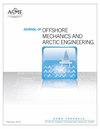海洋实验模拟器冰管理性能影响因素分析及其在决策支持系统设计中的应用
IF 2.1
4区 工程技术
Q3 ENGINEERING, MECHANICAL
Journal of Offshore Mechanics and Arctic Engineering-Transactions of the Asme
Pub Date : 2023-10-19
DOI:10.1115/1.4063617
引用次数: 0
摘要
冰管理对于维护北极地区海上作业的安全至关重要。我们介绍了在专门为冰管理设计的全任务桥模拟器中进行的三个实验的综合结果。从结果的定量分析中,我们推断出三个变量对绩效的影响:(1)经验,(2)培训和(3)决策支持系统(DSS)。结果证实,经验和培训可以提高未受过培训和没有经验的模拟器参与者的表现。DSS也提高了性能,但效果较小。通过船舶位置热图和出口访谈进行的定性观察表明,使用DSS的新手参与者采用了专家策略,但执行任务的速度较慢,精度较低。这对未来用于训练模拟器或船上的DSS的设计具有重要的影响。对DSS设计的潜在改进可能包括对用户的实时反馈、对人机界面(HMI)的重新设计,以及以人为因素为重点增加用户输入和定制。本文章由计算机程序翻译,如有差异,请以英文原文为准。
An Analysis of Factors Influencing Ice Management Performance in an Experimental Marine Simulator and their Application to Decision Support System Design
Abstract Ice management is essential for maintaining the safety of offshore operations in Arctic regions. We present the combined results of three experiments conducted in a full-mission bridge simulator specially designed for ice management. From a quantitative analysis of the results, we infer the effect of three variables on performance: (1) experience, (2) training, and (3) Decision Support System (DSS). The results confirm that experience and training improve performance for untrained and inexperienced simulator participants. The DSS also improves performance, but with a smaller effect. Qualitative observations using vessel position heat-map diagrams and exit interviews suggested that novice participants using the DSS adopted expert strategies but carried out their tasks more slowly and with less precision. This has important consequences for the design of a future DSS used in training simulators or onboard ships. Potential improvements to the DSS design might include real-time feedback to the user, a redesign of the human–machine interface (HMI), and increasing user input and customization with a human factors focus.
求助全文
通过发布文献求助,成功后即可免费获取论文全文。
去求助
来源期刊
CiteScore
4.20
自引率
6.20%
发文量
63
审稿时长
6-12 weeks
期刊介绍:
The Journal of Offshore Mechanics and Arctic Engineering is an international resource for original peer-reviewed research that advances the state of knowledge on all aspects of analysis, design, and technology development in ocean, offshore, arctic, and related fields. Its main goals are to provide a forum for timely and in-depth exchanges of scientific and technical information among researchers and engineers. It emphasizes fundamental research and development studies as well as review articles that offer either retrospective perspectives on well-established topics or exposures to innovative or novel developments. Case histories are not encouraged. The journal also documents significant developments in related fields and major accomplishments of renowned scientists by programming themed issues to record such events.
Scope: Offshore Mechanics, Drilling Technology, Fixed and Floating Production Systems; Ocean Engineering, Hydrodynamics, and Ship Motions; Ocean Climate Statistics, Storms, Extremes, and Hurricanes; Structural Mechanics; Safety, Reliability, Risk Assessment, and Uncertainty Quantification; Riser Mechanics, Cable and Mooring Dynamics, Pipeline and Subsea Technology; Materials Engineering, Fatigue, Fracture, Welding Technology, Non-destructive Testing, Inspection Technologies, Corrosion Protection and Control; Fluid-structure Interaction, Computational Fluid Dynamics, Flow and Vortex-Induced Vibrations; Marine and Offshore Geotechnics, Soil Mechanics, Soil-pipeline Interaction; Ocean Renewable Energy; Ocean Space Utilization and Aquaculture Engineering; Petroleum Technology; Polar and Arctic Science and Technology, Ice Mechanics, Arctic Drilling and Exploration, Arctic Structures, Ice-structure and Ship Interaction, Permafrost Engineering, Arctic and Thermal Design.

 求助内容:
求助内容: 应助结果提醒方式:
应助结果提醒方式:


